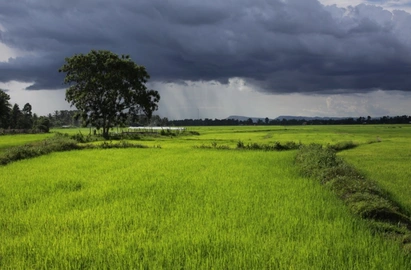Government investments in agro-climate services can be beneficial, demonstrates study in Vietnam
November 11, 2022.
A recently published study by authors of the University of Bonn (i.e. its hortibonn group and ZEF) demonstrates how decision-analysis approaches can support governments’ decision-making on investments in agro-climatic services.
The study “Decision analysis of agro-climate service scaling – A case study in Dien Bien District, Vietnam” was published in https://www.sciencedirect.com/science/article/pii/S2405880722000310 in August 2022 and provides insights from a case study conducted in Vietnam.
Agricultural practices are increasingly affected by extreme weather events, climate variability and climate change. Therefore, supporting farmers incorporate climate information in their decisions on what to plant and when to harvest could be useful. Agro-climate services offer such help. They include the provision of information about weather and climate (e.g. weekly weather forecasts, seasonal forecasts and climate outlooks) and agricultural advice for farmers. However, providing actionable agro-climate services has not been an investment priority for most governments.
The paper’s lead-author, Thi Thu Giang Luu, says about the research she conducted in the region of Dien Bien, Vietnam: “It has been challenging to quantify the benefits of agro-climate services since the weather forecast and the quality of advice on agricultural practices often go along with uncertainty. Concurrently, the gains of agro-climate services include both environmental and social benefits, the latter often being largely under-valued. The limited evidence makes it difficult for decision-makers to decide if and how they should invest in agro-climate services”.
The study in Vietnam showcases a novel decision-analysis approach to project the costs and benefits of agro-climate service interventions. The findings show that government investment into agro-climate services could have a high return on investment, from 1 up to 16 times. The findings are a result of a holistic participatory procedure to support decision-making without concerns about data measurement constraints. Instead of attempting to precisely quantify all variables, the modeling approach applied in the study integrates expert knowledge and systems- thinking to capture and understand the system, without assumptions of full certainty.
“In many cases, current knowledge of the system-understanding is good enough to support decision-making. Only if that is not the case we suggest collecting additional information on factors with critical knowledge gaps”, says Prof. Dr. Eike Luedeling of Horticultural Sciences at University of Bonn and co-author of the study. “This approach can overcome the limitations of conventional research that often provides detailed knowledge related to a little piece of the puzzle but often fails to include important intangible factors and therefore struggles to provide a complete picture necessary for decision-making.”
With the high potential return on investment, the study provides a strong positive signal for investments in climate services for farmers and suggests replacing deterministic with probabilistic approaches when analyzing uncertain and complex decisions.
Link to the study: https://www.sciencedirect.com/science/article/pii/S2405880722000310
For more information, contact Thi Thu Giang Luu,
unior researcher at ZEF, email: luuthithugiang(at)gmail.com


